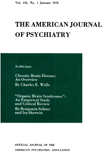Unipolar mania: a distinct clinical entity?
Abstract
Of the 241 lithium clinic patients at the New York State Psychiatric Institute with bipolar I affective disorder, 38 (15.7%) had never been hospitalized or somatically treated for depression. These "unipolar manic" patients had a significantly lower incidence of rapid cycling and suicide attempts than other bipolar I patients. No differences were found, however, in risk of illness in first-degree relatives. Lithium was an effective prophylactic agent in these patients. Some patients originally classified as "unipolar manic" were found to have depressive episodes with additional information and clinical observation. "Unipolar mania" appears to be a subgroup of bipolar I illness, but there are no data to support the hypothesis that it is a separate entity.
Access content
To read the fulltext, please use one of the options below to sign in or purchase access.- Personal login
- Institutional Login
- Sign in via OpenAthens
- Register for access
-
Please login/register if you wish to pair your device and check access availability.
Not a subscriber?
PsychiatryOnline subscription options offer access to the DSM-5 library, books, journals, CME, and patient resources. This all-in-one virtual library provides psychiatrists and mental health professionals with key resources for diagnosis, treatment, research, and professional development.
Need more help? PsychiatryOnline Customer Service may be reached by emailing [email protected] or by calling 800-368-5777 (in the U.S.) or 703-907-7322 (outside the U.S.).



